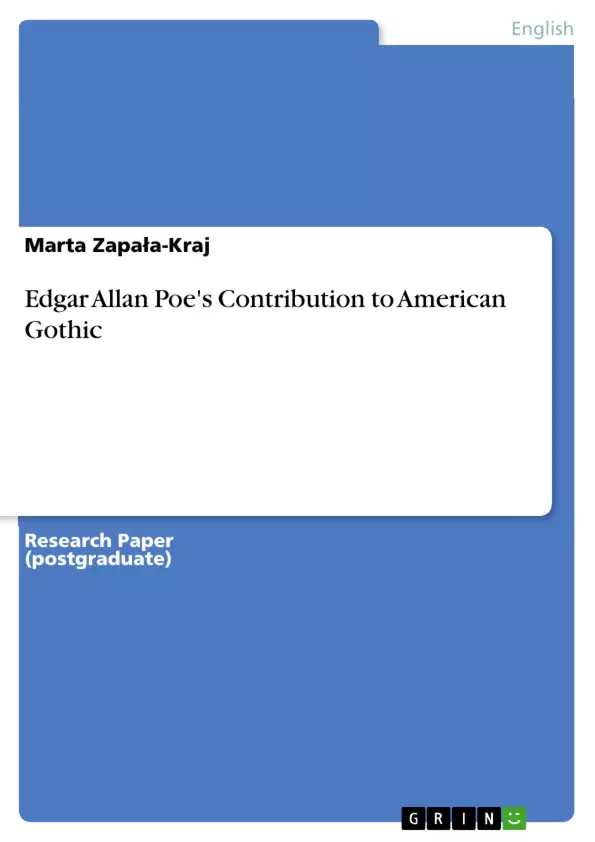If we were to ask ourselves who Edgar Allan Poe was, what would we answer? The first answer that would enter our mind would probably be that he was an author of the very first horror books. It is also agreed that he was the father of the detective fiction novels. The second answer would perhaps refer to his complicated bibliographical aspects, where historians could only be supposing, guessing and claiming.
Some people search for the truth of Poe’s death. There are various sources claiming that he died of extensive intoxication; the others claim that he was sober and died due to some mysterious factors. Edgar Allan Poe did nothing to sharpen the blurred vision of his life, quite contrarily - he repeated the fictional stories to name but one - that he joined the Greek in their fight for liberty in 1828. Since no headstone was placed over Poe’s grave when he was buried, some have claimed it as to be right of his grandfather, others to the left. As for his burial, both October 8 and 9 have been recorder in various places. No thing can be stated with certainty. Some mysteries connected with Edgar Allan Poe will probably remain unsolved.
It is evident that Poe had been influenced by the richness of Gothic literary legacy which was available to him. When analyzing the subject of his writing, form, style and even occasional use of precise motifs as well as tone, Poe proves that his predecessors have had a sound effect on him. However, what is equally evident, is that Poe created the Gothic fiction of his own style and trend, and in fact the question which shall arise is in what ways Poe shaped the American Gothic as we perceive it nowadays.
Table of Contents
- Introduction
- Chapter One
- Chapter Two
- Chapter Three
Objectives and Key Themes
This paper will analyze the Gothic origins of the horror genre and investigate the impact of Edgar Allan Poe's contributions to this literary tradition. It will explore the psychological and aesthetic aspects of the uncanny, tracing its influence on Poe's writings.- The evolution and characteristics of the Gothic genre
- Edgar Allan Poe's relationship with the Gothic tradition
- The psychological underpinnings of the uncanny
- The aesthetic exploration of fear and anxiety in literature
- Freud's theory of the uncanny and its application to Poe's works
Chapter Summaries
- Introduction: This chapter provides a general overview of the horror genre and its association with the Gothic tradition. It discusses the complex and multifaceted nature of horror literature, exploring its ability to evoke specific emotional responses in readers. The chapter also briefly outlines the historical development of the Gothic genre, emphasizing its roots in Romanticism.
- Chapter One: This chapter delves into the psychological underpinnings of the uncanny, focusing on Freud's groundbreaking essay, "Das Unheimliche." Freud's analysis of the uncanny, as a form of negative aesthetics, provides a theoretical framework for understanding the emotional impact of horror literature. This chapter will examine how Freud's theory can be applied to Poe's works, highlighting the author's mastery of creating unsettling and uncanny experiences for the reader.
Keywords
This work explores the Gothic genre, horror literature, the uncanny, Edgar Allan Poe, Sigmund Freud, and the psychological and aesthetic aspects of fear and anxiety in literature.Frequently Asked Questions about Edgar Allan Poe and Gothic Fiction
How did Edgar Allan Poe contribute to the American Gothic genre?
Poe transformed the traditional Gothic by focusing on psychological horror and the inner workings of the human mind rather than just external supernatural elements.
What is the concept of "The Uncanny" in literature?
Based on Freud's "Das Unheimliche," it refers to something familiar that has been repressed and returns in an unsettling or frightening way.
Is Poe considered the father of detective fiction?
Yes, Poe is widely credited with creating the detective genre with stories like "The Murders in the Rue Morgue."
What are some common motifs in Poe's Gothic stories?
Common motifs include premature burial, decaying mansions, psychological disintegration, and the double or "doppelgänger."
How does Poe's style differ from European Gothic predecessors?
While influenced by European traditions, Poe's work is more concise, aesthetically focused on "unity of effect," and deeply rooted in individual psychological trauma.
- Quote paper
- MA Marta Zapała-Kraj (Author), 2013, Edgar Allan Poe's Contribution to American Gothic, Munich, GRIN Verlag, https://www.grin.com/document/288323



